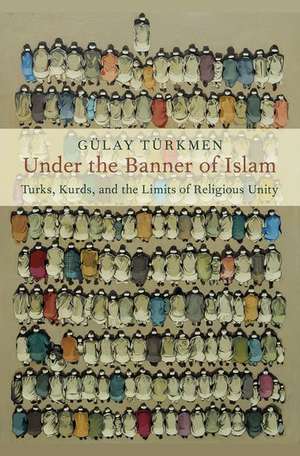Under the Banner of Islam: Turks, Kurds, and the Limits of Religious Unity: Religion and Global Politics
Autor Gülay Türkmenen Limba Engleză Hardback – 31 mar 2021
Din seria Religion and Global Politics
- 8%
 Preț: 190.80 lei
Preț: 190.80 lei - 27%
 Preț: 340.62 lei
Preț: 340.62 lei - 11%
 Preț: 169.48 lei
Preț: 169.48 lei - 22%
 Preț: 714.20 lei
Preț: 714.20 lei - 30%
 Preț: 758.57 lei
Preț: 758.57 lei - 18%
 Preț: 307.78 lei
Preț: 307.78 lei - 8%
 Preț: 297.06 lei
Preț: 297.06 lei - 27%
 Preț: 407.83 lei
Preț: 407.83 lei - 30%
 Preț: 500.13 lei
Preț: 500.13 lei -
 Preț: 309.38 lei
Preț: 309.38 lei -
 Preț: 303.92 lei
Preț: 303.92 lei - 30%
 Preț: 524.48 lei
Preț: 524.48 lei - 28%
 Preț: 419.27 lei
Preț: 419.27 lei - 22%
 Preț: 462.87 lei
Preț: 462.87 lei - 10%
 Preț: 243.45 lei
Preț: 243.45 lei - 8%
 Preț: 222.57 lei
Preț: 222.57 lei - 19%
 Preț: 233.72 lei
Preț: 233.72 lei - 18%
 Preț: 215.32 lei
Preț: 215.32 lei - 12%
 Preț: 322.91 lei
Preț: 322.91 lei - 14%
 Preț: 367.77 lei
Preț: 367.77 lei - 30%
 Preț: 553.30 lei
Preț: 553.30 lei - 13%
 Preț: 150.42 lei
Preț: 150.42 lei - 26%
 Preț: 558.74 lei
Preț: 558.74 lei - 30%
 Preț: 660.07 lei
Preț: 660.07 lei - 25%
 Preț: 588.37 lei
Preț: 588.37 lei - 13%
 Preț: 558.34 lei
Preț: 558.34 lei
Preț: 478.50 lei
Preț vechi: 526.96 lei
-9% Nou
Puncte Express: 718
Preț estimativ în valută:
91.59€ • 99.52$ • 76.99£
91.59€ • 99.52$ • 76.99£
Carte tipărită la comandă
Livrare economică 09-15 aprilie
Preluare comenzi: 021 569.72.76
Specificații
ISBN-13: 9780197511817
ISBN-10: 0197511813
Pagini: 204
Dimensiuni: 239 x 155 x 23 mm
Greutate: 0.43 kg
Editura: Oxford University Press
Colecția OUP USA
Seria Religion and Global Politics
Locul publicării:New York, United States
ISBN-10: 0197511813
Pagini: 204
Dimensiuni: 239 x 155 x 23 mm
Greutate: 0.43 kg
Editura: Oxford University Press
Colecția OUP USA
Seria Religion and Global Politics
Locul publicării:New York, United States
Recenzii
This is a good, concise account of the dilemma Turks and Kurds face in Turkey. Recommended. Advanced undergraduates through faculty.
This is an excellent, exhaustive study of the main social problem of religious nationalism in contemporary Turkey. Türkmen beautifully reveals that the way the current Turkish government privileges religion alone in determining nationalbelonging will not work in the long term, because of the way it silences ethnicity in general and the sizeable Kurdish population in Turkey in particular. A must-read for all interested in religion, ethnicity, nationalism, and globalization.
Religious unity is often presented as a panacea for violent ethnic conflict among Muslim groups. In this well-researched, conceptually innovative, and theoretically engaging book, Türkmen shows how a suprareligious approach fails to take deep sociological root and to offer a resolution to the Kurdish question in Turkey. Her in-depth interviews with both Kurdish and Turkish religious elites reveal how religious beliefs actually serve as the cement of distinct ethnic identities rather than superseding them. Her book is an important contribution to Kurdish studies and politics of religion and ethnicity literature.
Through her analysis of the discourse of Kurdish and Turkish religious personalities on Islam, ethnicity, and nationalism, Gülay Türkmen sheds significant new light on hitherto neglected but important aspects of the Kurdish conflict and the Islamic revival in Turkey.
The book's literary flair, which adds an engaging dimension to its content, cannot be ignored. The ability to present its remarkable academic depth in a fluent and compelling manner is the other striking feature of the book.
This is an excellent, exhaustive study of the main social problem of religious nationalism in contemporary Turkey. Türkmen beautifully reveals that the way the current Turkish government privileges religion alone in determining nationalbelonging will not work in the long term, because of the way it silences ethnicity in general and the sizeable Kurdish population in Turkey in particular. A must-read for all interested in religion, ethnicity, nationalism, and globalization.
Religious unity is often presented as a panacea for violent ethnic conflict among Muslim groups. In this well-researched, conceptually innovative, and theoretically engaging book, Türkmen shows how a suprareligious approach fails to take deep sociological root and to offer a resolution to the Kurdish question in Turkey. Her in-depth interviews with both Kurdish and Turkish religious elites reveal how religious beliefs actually serve as the cement of distinct ethnic identities rather than superseding them. Her book is an important contribution to Kurdish studies and politics of religion and ethnicity literature.
Through her analysis of the discourse of Kurdish and Turkish religious personalities on Islam, ethnicity, and nationalism, Gülay Türkmen sheds significant new light on hitherto neglected but important aspects of the Kurdish conflict and the Islamic revival in Turkey.
The book's literary flair, which adds an engaging dimension to its content, cannot be ignored. The ability to present its remarkable academic depth in a fluent and compelling manner is the other striking feature of the book.
Notă biografică
Gülay Türkmen is a sociologist and current postdoctoral fellow at the University of Goettingen. Her work examines how macro-scale historical and political developments inform questions of belonging and identity-formation in multi-cultural societies. She has published in several academic outlets including the Annual Review of Sociology, Qualitative Sociology, Sociological Quarterly, and Nations and Nationalism. She has written about developments in Turkish politics for Open Democracy and Jadaliyya.
